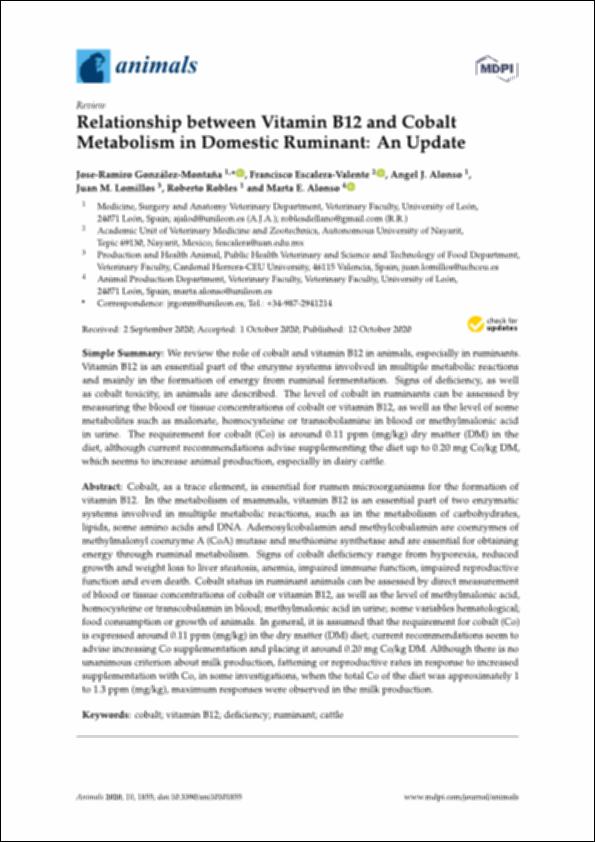Please use this identifier to cite or link to this item:
http://hdl.handle.net/10637/12487Relationship between Vitamin B12 and cobalt metabolism in domestic ruminant : an update
| Title: | Relationship between Vitamin B12 and cobalt metabolism in domestic ruminant : an update |
| Authors : | González Montaña, José Ramiro Escalera Valente, Francisco Alonso Díez, Ángel Javier Lomillos Pérez, Juan Manuel Robles, Roberto Alonso de la Varga, Marta Elena |
| Keywords: | Avitaminosis.; Cobalto.; Vitamina B12.; Cobalt.; Ganado vacuno lechero - Alimentación.; Dairy cattle - Feeding and feeds.; Vitamin B12. |
| Publisher: | MDPI |
| Citation: | González-Montaña, J.R., Escalera-Valente, F., Alonso, A.J., Lomillos, J.M., Robles, R. & Alonso, M.E. (2020). Relationship between Vitamin B12 and cobalt metabolism in domestic ruminant: an update. Animals, vol. 10, i. 10 (12 oct.), art. 1855. DOI: https://doi.org/10.3390/ani10101855. |
| Abstract: | Cobalt, as a trace element, is essential for rumen microorganisms for the formation of vitamin B12. In the metabolism of mammals, vitamin B12 is an essential part of two enzymatic systems involved in multiple metabolic reactions, such as in the metabolism of carbohydrates, lipids, some amino acids and DNA. Adenosylcobalamin and methylcobalamin are coenzymes of methylmalonyl coenzyme A (CoA) mutase and methionine synthetase and are essential for obtaining energy through ruminal metabolism. Signs of cobalt deficiency range from hyporexia, reduced growth and weight loss to liver steatosis, anemia, impaired immune function, impaired reproductive function and even death. Cobalt status in ruminant animals can be assessed by direct measurement of blood or tissue concentrations of cobalt or vitamin B12, as well as the level of methylmalonic acid, homocysteine or transcobalamin in blood; methylmalonic acid in urine; some variables hematological; food consumption or growth of animals. In general, it is assumed that the requirement for cobalt (Co) is expressed around 0.11 ppm (mg/kg) in the dry matter (DM) diet; current recommendations seem to advise increasing Co supplementation and placing it around 0.20 mg Co/kg DM. Although there is no unanimous criterion about milk production, fattening or reproductive rates in response to increased supplementation with Co, in some investigations, when the total Co of the diet was approximately 1 to 1.3 ppm (mg/kg), maximum responses were observed in the milk production. |
| Description: | Este artículo se encuentra disponible en la siguiente URL: https://www.mdpi.com/2076-2615/10/10/1855 Este artículo pertenece a la colección "Feeding cattle for health improvement". |
| URI: | http://hdl.handle.net/10637/12487 |
| Rights : | http://creativecommons.org/licenses/by/4.0/deed.es |
| ISSN: | 2076-2615 (Electrónico). |
| Issue Date: | 12-Oct-2020 |
| Center : | Universidad Cardenal Herrera-CEU |
| Appears in Collections: | Dpto. Producción y Sanidad Animal, Salud Pública Veterinaria y Ciencia y Tecnología de los Alimentos |
Items in DSpace are protected by copyright, with all rights reserved, unless otherwise indicated.


